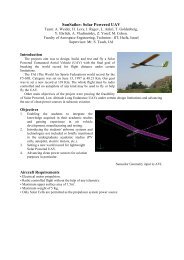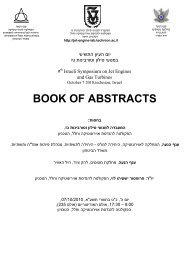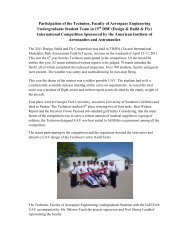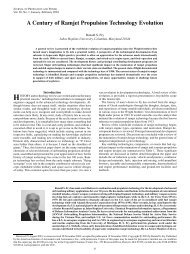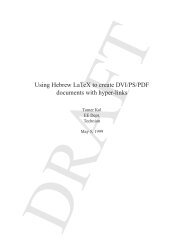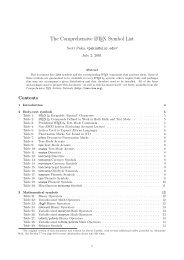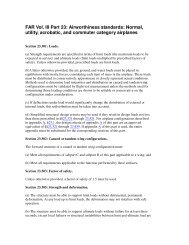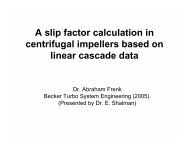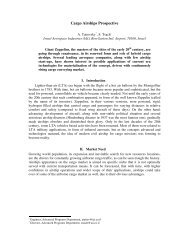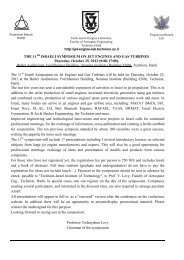PREPARATION OF PAPERS FOR THE IACAS CONFERENCE First ...
PREPARATION OF PAPERS FOR THE IACAS CONFERENCE First ...
PREPARATION OF PAPERS FOR THE IACAS CONFERENCE First ...
Create successful ePaper yourself
Turn your PDF publications into a flip-book with our unique Google optimized e-Paper software.
and<br />
I0(x) =<br />
I. General Grammar and Preferred Usage<br />
∞<br />
n x<br />
n=0<br />
2 n n!<br />
2<br />
. (3)<br />
Use only one space after periods or colons. Hyphenate complex modifiers: “zero-field-cooled magnetization.”<br />
Avoid dangling participles, such as, “Using Eq. (1), the potential was calculated.” [It is not clear<br />
who or what used Eq. (1).] Write instead “The potential was calculated using Eq. (1),” or “Using Eq.<br />
(1), we calculated the potential.”<br />
Use a zero before decimal points: “0.25,” not “.25.” Use “cm 3 ,” not “cc.” Indicate sample dimensions<br />
as “0.1 cm × 0.2 cm,” not “0.1 × 0.2 cm 2 .” The preferred abbreviation for “seconds” is “s,” not “sec.”<br />
Do not mix complete spellings and abbreviations of units: use “Wb/m 2 ” or “webers per square meter,”<br />
not “webers/m 2 .” When expressing a range of values, write “7 to 9” or “7–9,” not “7 9.”<br />
A parenthetical statement at the end of a sentence is punctuated outside of the closing parenthesis<br />
(like this). (A parenthetical sentence is punctuated within parenthesis.) In American English, periods<br />
and commas are placed within quotation marks, like “this period.” Other punctuation is “outside”!<br />
Avoid contractions; for example, write “do not” instead of “don’t.” The serial comma is preferred: “A,<br />
B, and C” instead of “A, B and C.”<br />
If you wish, you may write in the first person singular or plural and use the active voice (“I observed<br />
that. . . ” or “We observed that. . . ” instead of “It was observed that”). Remember to check spelling. If<br />
your native language is not English, please ask a native English-speaking colleague to proofread your<br />
paper.<br />
The word “data” is plural, not singular (i.e., “data are,” not “data is”). The subscript for the<br />
permeability of vacuum µ0 is zero, not a lowercase letter “oo.” The term for residual magnetization<br />
is “remanence”; the adjective is “remanent”; do not write “remnance” or “remnant.” The word “micrometer”<br />
is preferred over “micron” when spelling out this unit of measure. A graph within a graph<br />
is an “inset,” not an “insert.” The word “alternatively” is preferred to the word “alternately” (unless<br />
you really mean something that alternates). Use the word “whereas” instead of “while” (unless you<br />
are referring to simultaneous events). Do not use the word “essentially” to mean “approximately” or<br />
“effectively.” Do not use the word “issue” as a euphemism for “problem.” When compositions are<br />
not specified, separate chemical symbols by en-dashes; for example, “NiMn” indicates the intermetallic<br />
compound Ni0.5Mn0.5 whereas “Ni–Mn” indicates an alloy of some composition NixMn1−x.<br />
Be aware of the different meanings of the homophones “affect” (usually a verb) and “effect” (usually<br />
a noun), “complement” and “compliment,” “discreet” and “discrete,” “principal” (e.g., “principal<br />
investigator”) and “principle” (e.g., “principle of measurement”). Do not confuse “imply” and “infer.”<br />
Prefixes such as “non,” “sub,” “micro,” “multi,” and “ultra” are not independent words; they should<br />
be joined to the words they modify, usually without a hyphen. There is no period after the “et” in the<br />
abbreviation “et al.” The abbreviation “i.e.,” means “that is,” and the abbreviation “e.g.,” means “for<br />
example” (these abbreviations are not italicized).<br />
IV. CONCLUSION<br />
The paper should end with a conclusion (or summary) section. Although the conclusions may review<br />
the main points of the paper, do not replicate the abstract as the conclusions. The conclusions should<br />
elaborate on the importance of the work or suggest applications and extensions. b<br />
ACKNOWLEDGMENTS<br />
The preferred spelling of the word “acknowledgment” in American English is without the “e” after<br />
the “g.” Avoid expressions such as “One of us (S.B.A.) would like to thank. . . [.]” Instead, write “F.<br />
A. Author thanks. . . [.]” Sponsor and financial support acknowledgments are also to be listed in the<br />
acknowledgments section.<br />
b The conclusion section is the last section of the paper that should be numbered. Acknowledgments, appendix (if<br />
present), and references should be listed without numbers.<br />
4





